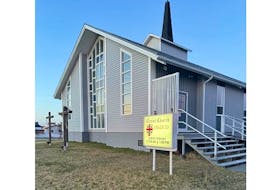Under the shelter of tarps from rain Tuesday, protesters on Bell Island keeping the MV Legionnaire from leaving port are optimistic about a possible settlement to the dispute.
A solution had been offered, Transportation and Works Minister Steve Crocker said and Conception Bay East-Bell Island MHA David Brazil indicated.
Protest organizer Valerie Ryan, however, said they were getting conflicting reports as to what the settlement entails.
She said protesters want the settlement in writing — including a guarantee that if the Legionnaire is sent to Fogo Island this time, it will not happen again in the future and it will no longer be considered a swing vessel.
There was to be a public meeting on Bell Island Tuesday evening to vote on whether to accept the settlement. And it was, ultimately, accepted.
Last Friday, the government announced the Legionnaire was to leave the Bell Island-Portugal Cove route to begin servicing the Fogo Island-Change Islands-Farewell run to fill in for the MV Veteran while it is out of service to undergo repairs to its port thruster.
The Beaumont Hamel was to join the Flanders to service the Bell Island-Portugal Cove route.
The changes were to go into effect on Sunday, but were foiled by the protest.
Crocker said at the House of Assembly Tuesday that, after talks Monday evening and Tuesday morning, he expected to ultimately move the Legionnaire to the Fogo Island run, but with an enhanced service for Bell Island.
“This morning we met again (with Bell Island ferry users) with what we thought was a reasonable suggestion of a schedule and when we met with the ferry users committee this morning they also felt that, under the circumstances, it was a reasonable offer,” he said.
The offer was to be considered further by the group, with a final decision later.
Crocker was asked if changes being made to the previously planned Bell Island ferry schedule were because of the protests.
“I would attribute that to the conversations we had and really listening to the commuters group (Monday) afternoon when they talked about first-hand knowledge of how the schedule works,” he said, adding the department then made some tweaks.
The Legionnaire was expected to be underway in the next day or so, he said.
The new schedule for the Bell Island run is estimated to cost about $87,000, but maintains a two-vessel service there.
“As a department I think we achieved what we need to achieve here — both in the interest of the commuters and the travelling public on Bell Island, and also the best interest of the department,” Crocker said.
As the protest went ahead Monday and Tuesday, the MV Flanders continued to work the Bell Island-Portugal Cove run on a load-and-go basis.
The protesters were concerned that any downgrade in the service with the Legionnaire gone would mean commuters during morning and evenings — going to and from work — would go back to two- and three-hour waits to cross the tickle.
There were a number of other concerns raised on the dock about disabled and ill people not being able to take the Flanders. Two issues pointed out were that the elevator was not working on the Flanders and, because of a newly enforced policy, passengers are not allowed to remain in their vehicles during the approximately 20-minute ferry ride between the island and Portugal Cove.
People were relating stories of residents with dialysis and mobility issues who were unable to board the Flanders, and one person who was scheduled for surgery but would likely have to go by ambulance on the ferry (a patient does remain in the ambulance during the crossing) or by air ambulance.
“Because of this ludicrous rule that you have to exit your vehicle, regardless of your medical condition, regardless if you can barely walk, we have dialysis patients and patients receiving chemotherapy that have to exit their vehicles for a 20-minute ferry ride,” Ryan said.









